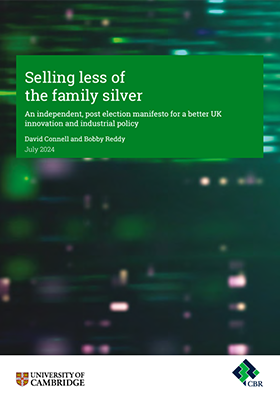 Changes to UK innovation and industrial policy could reduce the early sale of promising companies to overseas firms and increase economic growth, says new report from Cambridge Judge Business School (JBS) co-authored by Faculty Professor of Corporate Law and Governance Bobby Reddy.
Changes to UK innovation and industrial policy could reduce the early sale of promising companies to overseas firms and increase economic growth, says new report from Cambridge Judge Business School (JBS) co-authored by Faculty Professor of Corporate Law and Governance Bobby Reddy.
The early sale of venture capital-backed science and technology-based start-ups is the most important problem facing UK innovation and industrial policy, says a report issued last week (11 July) by the Centre for Business Research (CBR) at Cambridge Judge Business School.
Although the sale of large, mature firms such as ARM and Micro Focus often create headlines, acquisitions of earlier-stage innovative British companies – such as Deepmind, Solexa, Skyscanner, Shazam and Neptune Energy – by overseas buyers are arguably more damaging to the British economy.
Such early acquisitions result in a "truncation of subsequent firm growth in the UK", says the report, which calls for a shift in government funding away from blanket subsidies and towards focused funding through contracts, grants and equity investments.
"It is essential that ambitious entrepreneurs with the desire and ability to grow a major UK corporation are given as much help as possible to do so, whether this be as a public or private company," says the 66-page report, entitled Selling less of the family silver.
The report is authored by David Connell, Senior Research Fellow at the CBR, and Bobby Reddy, Professor of Corporate Law and Governance. The report, issued a week after the election of Sir Keir Starmer as the UK’s new Prime Minister, is subtitled An independent, post-election manifesto for a better UK innovation and industrial policy.
The full report can be found on the Judge Business School website.

 Facebook
Facebook  X/Twitter
X/Twitter  Instagram
Instagram  YouTube
YouTube  Flickr
Flickr  LinkedIn
LinkedIn